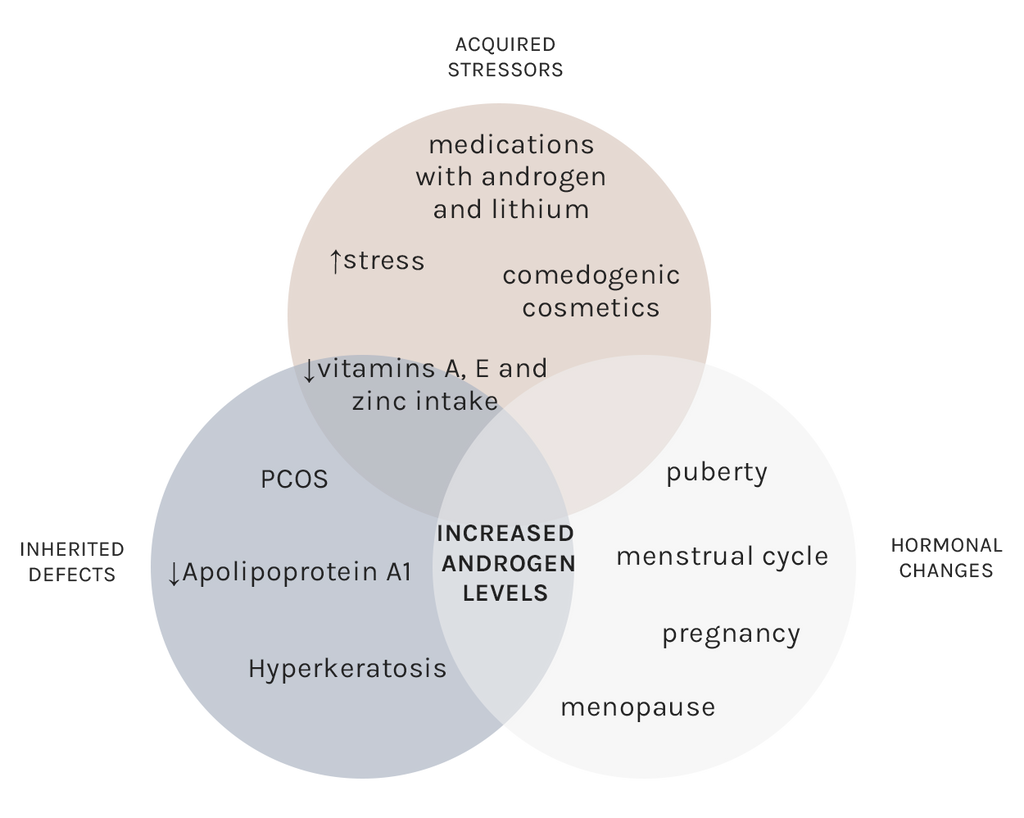
How to treat your acne, sensitively
If you have acne, know you're not alone. Acne vulgaris affects about 85% of teenagers and can continue into adulthood with a 51% prevalence rate in women in their twenties.
First of all, whatever you do, try not to pop it!
As satisfying as you think it might be, try to resist the temptation to pop your pimples, especially if they are cystic. As you enter your twenties, your acne goes through some major changes, which mean that your zits are no longer juicy whiteheads that explode with a satisfying pop. Instead they become deep pockets filled with white blood cells. Digging your fingers into your skin in order to pop these deep pockets will not only be in vain, but can damage your skin around the zit making things worse.
So, what is acne?
Acne occurs when the pores of your skin become clogged with oil (sebum) that glue dead skin cells together. Once this occurs, the anaerobic conditions favor the growth of bacteria such as Propionibacterium acnes. This bacterium feeds on the fatty acids of the sebum and damages the follicles cells.
These blockages produce whiteheads, blackheads, papules, pustules and nodules.

Why does acne develop?
A range of factors trigger acne, but the main cause is thought to be a rise in androgen levels. Androgen is a type of hormone - the levels of which rise when adolescence begins. Rising androgen can cause the oil glands under the skin to grow causing the enlarged glands to produce more sebum.
This sebum then carries dead skin cells to the surface of the skin through the follicles, where hair begins to grow from the follicle out of the skin. When the follicles get blocked, pimples grow, causing oil to build up under the skin.
The oil building up under the skin can become infected with bacteria (Propionibacterium acnes), resulting in swelling.

GENETIC FACTORS
Acne is most often inherited, with some estimates placing the likelihood of this happening between 50-90%.
HORMONAL CHANGES
As commonly known, changes in your hormones through puberty and menstruel cycles can often contribute to increased sebum production and the formation of acne.
COSMETIC PRODUCTS
Often less obvious, but many cosmetic products, from skincare to makeup, can also cause acne even for those who would not have developed it otherwise (the irony!). When this happens you develop a type of acne called ‘acne cosmetics’. Since it can take anywhere between a few days and 6 months for blemishes to appear, it is often overlooked as a trigger. Continuing using the same cosmetic products, or trying to coverup your acne with the same culprit makeup will lead to a never-ending cycle of breakouts.
EMOTIONAL STRESS
Some scientific researchers have indicated that acne severity is correlated with an increase in stress levels and stress has been listed as a factor attributed to acne flare ups.
MEDICATIONS
that contain androgen and lithium.
POOR QUALITY DIET
High sugar and trans-fatty acid intake.
How to treat or avoid acne
- Do not scrub your skin or try to pop your pimples, as this can move the infection deeper into your skin, causing more blocking, swelling, and redness. Popping your pimples can also make scarring more likely.
- Refrain from touching the face. Also great against COVID so that is a bonus!
- Hold the telephone away from the face when talking, as it is likely to contain sebum, skin residue and bacteria.
- Keep your hair clean as it collects sebum and skin residue.
- Try to reduce anxiety and stress where possible and feasible. Doing so can decrease the production of cortisol and adrenaline, reducing your chance of worsening acne.
- Choose your makeup and skincare products carefully. The best piece of advice here is to always read the label! Try ensure your products are oil-free, or non-comedogenic. For example, avoid cocoa butter, coconut oil, avocado oil, wheatgerm oil, olive oil, etc. You can always contact an independent expert for help if nothing seems to help.
- Pay attention to what you eat. Scientists have found that people who consume a diet that offers a good supply of vitamins A and E and of zinc have a lower risk of severe acne. Increase omega-3 fatty acid, fruit and vegetable intake, consume less sugar and avoid iodized salt.
- Stimulate your digestive system by consuming bitter herb extracts before meals.
Recommended skincare routine for acne
- Wash your face twice a day with a mild cleanser with AHAs and BHAs when you wake up and before you go to bed.
- Remove your makeup, including eye makeup, before going to bed. Avoid scrubbing your face, even when removing makeup.
- Gently exfoliate your skin with a salicylic clay mask once or twice a week to break down blackheads and whiteheads and reduce inflammation and swelling.
- Kill the bacteria that are trapped within the follicle, causing inflammation. Use skincare products with antibacterial plant extracts, like manuka oil, hop extract, chamomile oil, hemp seed oil, tea tree oil, green tea.
- Moisturise with products containing Bakuchiol (safe alternative to Retinol) that help unblock pores through cell turnover, and natural sebum regulators like Saw palmetto, or Niacinamide (a type of vitamin B3). We do not recommend using Retinoids or Azelaic acid - especially for sensitive skin - as they can cause irritation, photosensitivity and develop eczema over time.
- Reduce redness with products that chauve anti-inflammatory components, like Aloe Vera, Chamomile (Bisabolol), Calendula, Allantoin, Willow bark.
Find our solutions for acne-prone and oily skin here.




